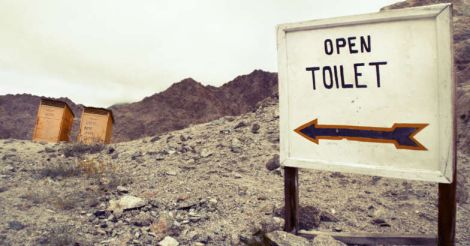Kerala government is now pushing for a status of open defecation-free (ODF) state by November 1, and is planning to declare the state as ODF on the same day.
Chief minister Pinarayi Vijayan, after his meeting with prime minister Narendra Modi, said the Center will cooperate with the state in this effort, including the construction of toilets in households, a step toward achieving the ODF status. Pinarayi also said that there is a target of constructing two lakh odd toilets in households of Kerala. While addressing a gathering in Kerala, CPM state secretary Kodiyeri Balakrishnan also underlined the importance of constructing toilets in households.
Easier said than done
First, the state government, policy makers and social scientists would have to look at the fact that the habit of defecating in open air is not always because of a lack of infrastructure; in this case, a toilet. It is always attributed to certain social reasons, personal reasons and behavioural patterns.
For instance, take this group of women in Rajasthan who defecate in the open during the early hours of the day. Social scientists found out that the women saw it as the only occasion for them to go out in a group from their houses and interact with each other freely, without their husbands keeping an eye on them! And the group flatly refused the offer to build them a toilet.
One can find many such reasons for the non-usage of toilets, across the country, where open-air defecation still exists. In order to tackle these varied issues prevailing in different pockets, it is necessary for state governments to come up with local-specific behaviour-change communication initiatives. Carpet bombing the same communication package for an entire state, or even for a district will not translate into behaviour change.
There should be attempts to understand the underlying reason for non-usage of toilets and then align the behaviour-change communication activities and support systems to modify the communities’ behaviour. This is a process which will take more time than the construction of lakhs of toilets.
The government of India is trying hard to address the issue of open-air defecation in bigger states such as Uttar Pradesh, Madhya Pradesh, Bihar, Chhattisgarh, Rajasthan and Jharkhand, which together have the largest chunk of population defecating in open air. The government is synchronizing its initiatives with that of international agencies, civil society organisations and non-governmental organisations to address this protracted issue. There are several models existing in the country where various districts have attained the ODF status through innovative initiatives. Churu district in Rajasthan is a case in point.
During the campaign period, the president of a village used to patrol the open areas of his village in the morning and blow a whistle when he found people defecating there. People got irritated with him, and eventually ended up in demanding a toilet in their households. This worked there but may not work elsewhere.
In another village, there was an old man who could identify people from their footprints. Every morning he would identify those who defecated in open air and report them to the panchayat authorities. The panchayat authorities then used to visit the ‘suspects’ and make them understand the importance of having a toilet at home, and also provide them with a toilet after those people raised a demand.
Chokho Churu
Why could not the govt of Rajasthan scale up the Churu model, widely known as the Chokho Churu campaign, to the entire state? Because success depends upon the initiative of the district authorities as well. Enormous creativity from the district collector, apart from the administrative capacities, is required to convert a district into open air defecation-free status.
In Kerala, one can see toilets constructed in tribal house-holds of Attappadi that are used as goat shelters and store rooms. While the government can boast about the number of toilets constructed, the ground reality on open-air defecation hasn’t changed. People will ‘enjoy’ relieving themselves in open areas. Total Sanitation Campaign and Jalanidhi (the Kerala Rural Water Supply and Sanitation Programme) have sanitation activities aligned to their ongoing activities. Their capacities should be leveraged while taking up ODF campaigns in Kerala.
Learning what clicked in districts like Churu would enhance the skill of Team Kerala working for ODF status. Exposure visits to successful (and failed) districts will give them a reality check, and fuel their onward journey. It will reduce errors as well.
To conclude, constructing two lakh odd toilets may be easy before the next birthday of the state, i.e., 1 November. But ensuring that those toilets are utilized would be an ambitious ask!
(The author is a Delhi-based development communication professional)

























